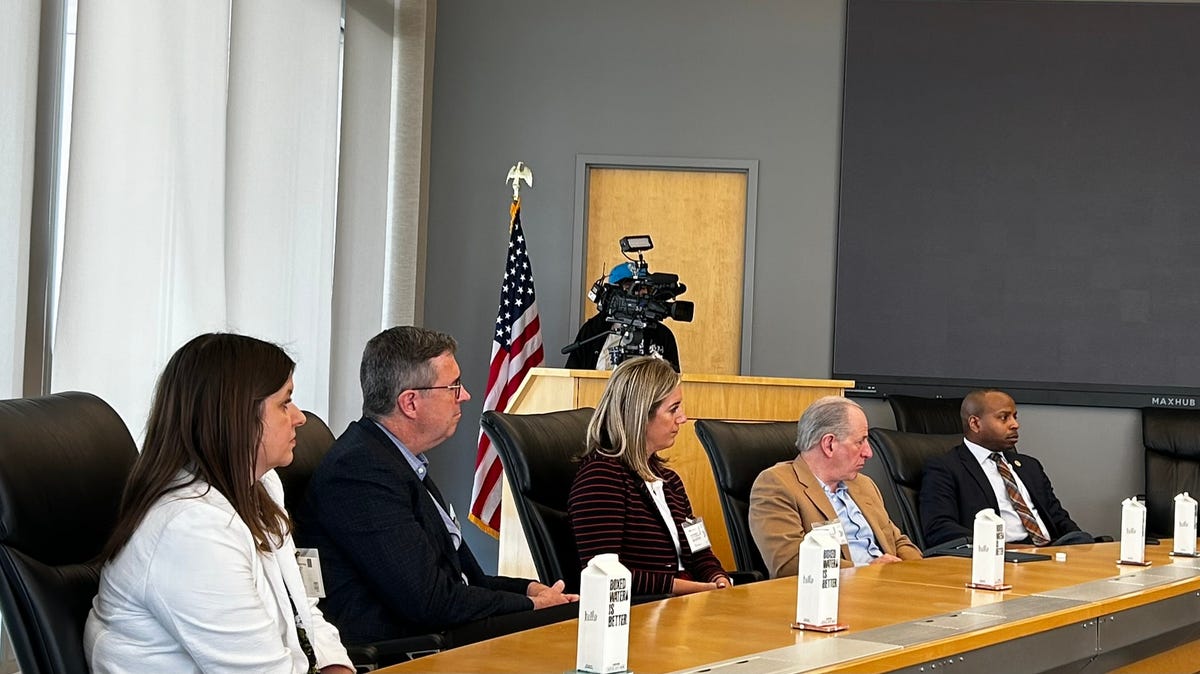Bussiness
Wisconsin business leaders have a message for fellow employers. Encourage your workers to vote

New York Times columnist says nation is divided about democracy itself
Ezra Klein is the La Follette School of Public Affairs spring 2024 Public Affairs Journalist in Residence. He will speak at UW-Madison April 16.
A group of Wisconsin business leaders is pushing for more employers to encourage voting and other civic engagement.
The nonpartisan civic engagement group, the Wisconsin Business Leaders For Democracy, advocated for Wisconsin businesses to allow for voting during work time, facilitate voter registration and encourage poll working.
Among the speakers at a roundtable discussion Friday were Milwaukee Mayor Cavalier Johnson, Milwaukee Election Commissioner Claire Woodall, business leaders including Greg Marcus, CEO of The Marcus Corp.; Tom Florsheim, CEO of Weyco Group; and Paul Miller, cofounder of Colectivo Coffee.
“I know how critically important it is to have people across our city to be engaged in our electoral process,” Johnson said at the event. “Everybody in this community should raise their voice to vote … none of this works unless we have an engaged democracy.”
Here are the main takeaways from the event.
Poll workers needed in Milwaukee’s elections
Woodall said the biggest need for local elections is workers at the polls, particularly in early afternoon shifts.
She said the Milwaukee elections take about 2,300 poll workers and the city battles issues with workers not showing up for shifts.
“We’re still seeing large numbers of people who, life happens, maybe they aren’t feeling well,” Woodall said. “They wake up and they decide not to come to work. So then we’re left scrambling.”
Many of the attendees said they encourage workers to become poll workers and Woodall said the city has a permanent position dedicated to training poll workers at off-site locations, like businesses with groups of interested employees.
Among those encouraging workers was Colectivo’s Miller, who employs about 500 workers in Wisconsin. Woodall referenced that one of the company’s cafés had its entire staff work at the polls and Miller said that they encourage poll workers by paying the difference between poll worker pay and their typical daily pay.
Combatting misinformation key to public safety, mayor says
David Irwin, president and CEO of gThankYou, a provider of gift certificates for food items, raised the topic of distrust in elections during the event. He noted the need for the business community to combat misinformation to maintain trust in elections.
Irwin, who said he typically supports “right of center” politicians, said he viewed some of the misinformation coming from his political community.
“A lot of the people who have been kind of part of my political community for the last couple of decades, I view, as having been on kind of the wrong side of spreading disinformation and sowing undue lack of confidence in our elections,” he said. “We need to really, as leaders of business or anything, we need to fight misinformation and we need to encourage anyone … to seek out the truth.”
The topic was raised again when Irwin was in discussion with Johnson, when he asked the mayor his thoughts on public safety around elections.
Johnson stressed the need for the public to understand and trust the electoral process as one that is fair and safe.
“Folks have to first understand that and know that,” he said. “We want people engaged in our electoral process.”
What local businesses are doing to encourage civic engagement
Almost all of the business leaders emphasized the work they’ve done to facilitate voter engagement in their workforce.
Tom Florsheim, of the shoe company Weyco Group, said his company has given paid time off to vote; offered on-site voter registration; and paid time off for working at the polls.
Others like Lori Richards, president and CEO of Mueller Communications, said her company gives 24 hours of paid time off for activities like poll working.
“We believe that companies are in a unique position, because the large number of people we employ, to really have an impact on civic engagement in Milwaukee,” Florsheim said.
Marcus stressed the need for further civic engagement and took note of primary elections decided by smaller groups of voters who may advance candidates who don’t represent larger community interests.
“Our system is not delivering the results that we want,” he said. “If we delivered this as companies, our customers would be screaming at us.”
How Milwaukee, Wisconsin businesses can do more. There’s a toolkit
The Wisconsin Business Leaders For Democracy promoted a civic engagement toolkit the group designed. That toolkit had been incorporated by almost all of the attendees of the roundtable event and was positioned as a strong step forward for other businesses looking to build on it.
The toolkit, while not updated yet for the upcoming November election, provides a suggested timeline for how businesses should share information on elections. For example, the April election iteration had communication plans for five weeks before, two weeks before, one week before and the morning of the election. Those plans were centered around either making a plan to vote early or on election day.
Additionally, the plan offered links to information on working the polls and email templates for a company’s human resources departments to send to employees.
The toolkit can be downloaded from the group’s website and Florsheim said it will be updated for the November election soon.
How to register to vote in Wisconsin (you’ll need a have a photo ID)
Here’s how to register and vote in Wisconsin.








/cdn.vox-cdn.com/uploads/chorus_asset/file/24100829/226345_Nest_Doorbell_wired_JTuphy_0006.jpg)
